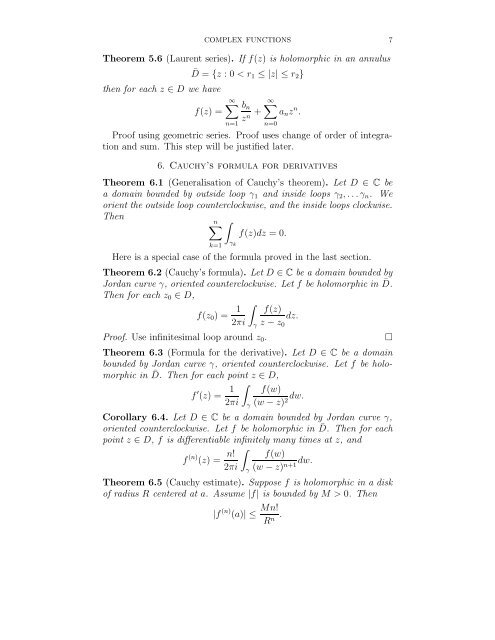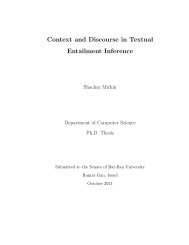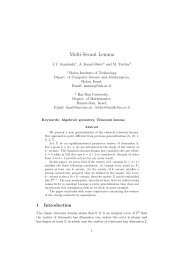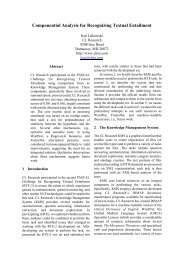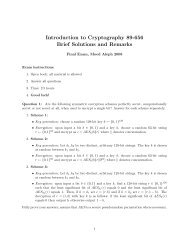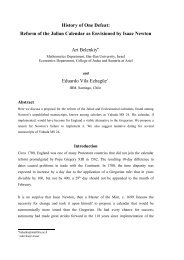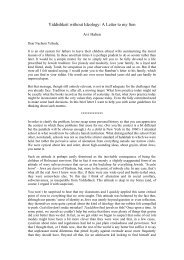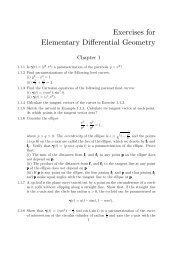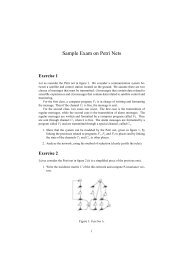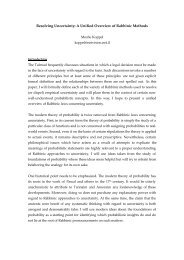COMPLEX FUNCTIONS Contents 1. Complex numbers, Cauchy ...
COMPLEX FUNCTIONS Contents 1. Complex numbers, Cauchy ...
COMPLEX FUNCTIONS Contents 1. Complex numbers, Cauchy ...
You also want an ePaper? Increase the reach of your titles
YUMPU automatically turns print PDFs into web optimized ePapers that Google loves.
<strong>COMPLEX</strong> <strong>FUNCTIONS</strong> 7<br />
Theorem 5.6 (Laurent series). If f(z) is holomorphic in an annulus<br />
¯D = {z : 0 < r 1 ≤ |z| ≤ r 2 }<br />
then for each z ∈ D we have<br />
f(z) =<br />
∞∑ b n<br />
z + ∑ ∞<br />
a n n z n .<br />
n=1<br />
Proof using geometric series. Proof uses change of order of integration<br />
and sum. This step will be justified later.<br />
n=0<br />
6. <strong>Cauchy</strong>’s formula for derivatives<br />
Theorem 6.1 (Generalisation of <strong>Cauchy</strong>’s theorem). Let D ∈ C be<br />
a domain bounded by outside loop γ 1 and inside loops γ 2 , . . . γ n . We<br />
orient the outside loop counterclockwise, and the inside loops clockwise.<br />
Then<br />
n∑<br />
∫<br />
f(z)dz = 0.<br />
γ k<br />
k=1<br />
Here is a special case of the formula proved in the last section.<br />
Theorem 6.2 (<strong>Cauchy</strong>’s formula). Let D ∈ C be a domain bounded by<br />
Jordan curve γ, oriented counterclockwise. Let f be holomorphic in ¯D.<br />
Then for each z 0 ∈ D,<br />
f(z 0 ) = 1 ∫<br />
2πi γ<br />
Proof. Use infinitesimal loop around z 0 .<br />
f(z)<br />
z − z 0<br />
dz.<br />
Theorem 6.3 (Formula for the derivative). Let D ∈ C be a domain<br />
bounded by Jordan curve γ, oriented counterclockwise. Let f be holomorphic<br />
in ¯D. Then for each point z ∈ D,<br />
f ′ (z) = 1<br />
2πi<br />
∫<br />
γ<br />
f(w)<br />
(w − z) 2 dw.<br />
Corollary 6.4. Let D ∈ C be a domain bounded by Jordan curve γ,<br />
oriented counterclockwise. Let f be holomorphic in ¯D. Then for each<br />
point z ∈ D, f is differentiable infinitely many times at z, and<br />
f (n) (z) = n!<br />
2πi<br />
∫<br />
γ<br />
f(w)<br />
dw.<br />
(w − z)<br />
n+1<br />
Theorem 6.5 (<strong>Cauchy</strong> estimate). Suppose f is holomorphic in a disk<br />
of radius R centered at a. Assume |f| is bounded by M > 0. Then<br />
|f (n) (a)| ≤ Mn!<br />
R n .<br />
□


